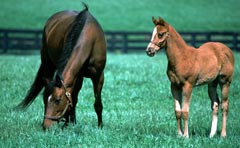Farm Receipts, Net Income Dropped in 2001 and Likely to Remain Lower in 2002
Farm Receipts, Net Income Dropped in 2001 and Likely to Remain Lower in 2002

Farm cash receipts and net farm income declined in 2001 and will likely decline again in 2002.
The farm cash receipts for 2001 declined by 7 percent to $3.65 billion compared to $3.9 billion in the previous year. Livestock enterprises make up nearly 60 percent of the state's total cash receipts.
Kentucky's lower net farm income is the result of lower receipts for tobacco, horses and government payments, said Gregg Ibendahl, University of Kentucky Extension agricultural economist. In 2000, the state saw $1.6 billion in net farm income mostly through additional government payments and over tobacco payments.
"With higher costs for fuel and fertilizer, lower receipts for tobacco and horses, and a slight drop-off in government payments, net farm income is going to drop to $1 billion," Ibendahl said during an agricultural economic outlook conference sponsored by the UK Department of Agricultural Economics.
Tobacco and the equine industries saw estimated declines in cash receipts this year of $144 million and $210 million respectively. Equine was the leading farm enterprise in the state for the second year despite the drop in receipts due largely to lower receipts for breeding stock, declines in yearling sales and lost boarding fees largely as the result of Mare Reproductive Loss Syndrome.
Total cash receipts are expected to decline another 5 percent in 2002, Ibendahl said. The major reasons for the drop are expected losses in the equine industry because of Mare Reproductive Loss Syndrome. Some estimates suggest that as many as 25 percent of the expected 2002 foals were aborted during 2001.
The equine industry will likely continue to be the leading farm enterprise in the state in 2002 even with the expected drop in cash receipts.
Net farm income will bounce back slightly in 2002 because of lower fuel and fertilizer costs and lower interest rates but it is not going to be anywhere near the 2000 level, which was a record year, but it may be above the 10-year average.
"Key for farmers is going to be government payments," he said. "The question is, are we going to get $20 billion in the U.S. in future farm bills. Mainly those payments are helping to support land values and net farm income."
Government payments account for 30 percent of the net farm income in Kentucky, Ibendahl said. But it accounts to around 85 percent of the net farm income for many full-time farmers, based on Kentucky Farm Business Management data, Ibendahl said.
From a financial perspective farmers are in good shape as their equity has been growing even though their debt has grown a little as well. Debt to asset ratio is around 15 percent which is relatively low from a historic perspective, he said. So as long as government payments continue to support the farmer's equity, farmers can weather some rough periods and have the equity to borrow money if necessary.
But recent events such as the Sept. 11 terrorist attacks and the soft economy could impact future federal agriculture spending, he said.
